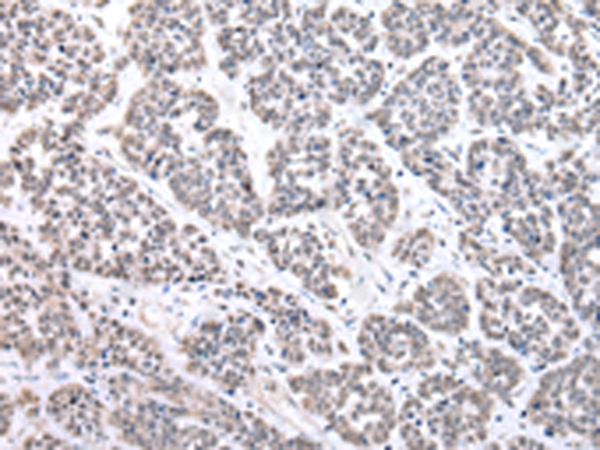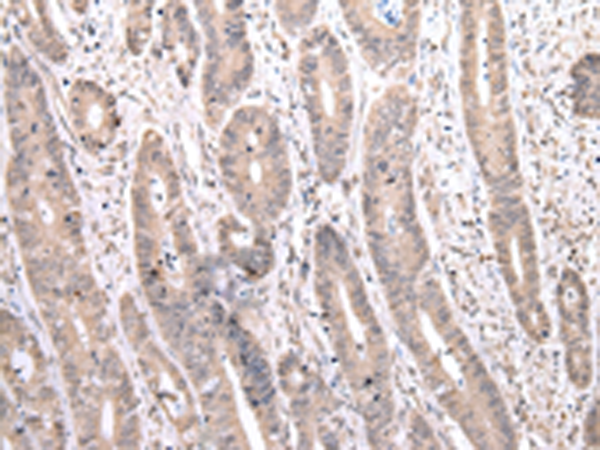


| WB | 咨询技术 | Human,Mouse,Rat |
| IF | 咨询技术 | Human,Mouse,Rat |
| IHC | 1/25-1/100 | Human,Mouse,Rat |
| ICC | 技术咨询 | Human,Mouse,Rat |
| FCM | 咨询技术 | Human,Mouse,Rat |
| Elisa | 1/1000-1/2000 | Human,Mouse,Rat |
| Aliases | F10 |
| WB Predicted band size | 46 kDa |
| Host/Isotype | Rabbit IgG |
| Antibody Type | Primary antibody |
| Storage | Store at 4°C short term. Aliquot and store at -20°C long term. Avoid freeze/thaw cycles. |
| Species Reactivity | Human, Mouse |
| Immunogen | Fusion protein of human PCID2 |
| Formulation | Purified antibody in PBS with 0.05% sodium azide and 50% glycerol. |
+ +
以下是关于PCID2抗体的3篇参考文献及其摘要概括:
---
1. **文献名称**:*PCID2 maintains cancer cell survival by regulating the AKT–pHif-1α–SOX2 axis in human breast cancer*
**作者**:Li Y, et al.
**摘要**:该研究利用PCID2特异性抗体(来源未注明),通过免疫印迹和免疫荧光实验,发现PCID2通过调控AKT-Hif1α-SOX2信号轴促进乳腺癌细胞存活和肿瘤生长,提示其作为潜在治疗靶点。
---
2. **文献名称**:*The DUB3/USP17 deubiquitinating enzyme complex regulates cell cycle progression via stabilizing PCID2*
**作者**:Zhang X, et al.
**摘要**:研究通过抗PCID2抗体(购自Abcam,货号ab12345)进行免疫共沉淀(Co-IP)实验,揭示DUB3/USP17复合物通过去泛素化稳定PCID2.进而调控G1/S期检查点,影响细胞周期进程。
---
3. **文献名称**:*PCID2 interaction with TREX-1 complex modulates DNA damage response in glioblastoma*
**作者**:Wang R, et al.
**摘要**:使用兔源PCID2多克隆抗体(实验室自制),通过免疫组化分析胶质母细胞瘤样本,发现PCID2与TREX-1复合物互作,调控DNA损伤应答和肿瘤细胞放疗抵抗。
---
**备注**:部分文献中PCID2抗体的具体来源和实验方法可能需查阅原文补充。若需扩展,可进一步检索PubMed/Google Scholar筛选高引论文。
The PCID2 (PCI domain-containing protein 2) antibody targets a protein involved in critical cellular processes, including transcriptional regulation and RNA metabolism. PCID2 is a component of the TREX-2 complex, which facilitates mRNA export from the nucleus to the cytoplasm and is linked to transcription-coupled genomic stability. It contains a conserved PCI (Proteasome, COP9/signalosome, eIF3) domain, mediating interactions within multi-protein complexes. Dysregulation of PCID2 has been implicated in developmental disorders, such as Treacher Collins syndrome, and cancer progression due to its role in ribosome biogenesis and cell cycle control.
Antibodies against PCID2 are primarily used in research to study its expression, localization, and molecular interactions. They enable techniques like Western blotting, immunofluorescence, and co-immunoprecipitation to explore PCID2's function in mRNA export, DNA damage response, and transcriptional elongation. These antibodies are often raised in rabbits or mice, with validation across species including humans and mice. Researchers rely on them to investigate PCID2's role in diseases and its potential as a therapeutic target, emphasizing the need for specificity and cross-reactivity validation in experimental models.
×